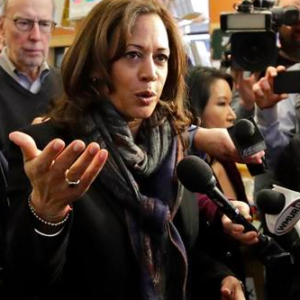2020 Democratic presidential contender Kamala Harris has rolled out her criminal justice reform plan, but it doesn’t line up with her record as a California prosecutor. In fact, her plan backtracks on many of her former policy positions and glosses over her controversial decisions.
Harris, 54, was elected San Francisco District Attorney in 2003 and California’s Attorney General in 2010 — the first woman to hold either position. On her website, the campaign says, “Our criminal justice system is deeply flawed, infected with bias, and in urgent need of reform. This isn’t something Kamala had to be taught, it’s something she’s always understood.”
Previewing the plan for the press, Harris said, “I know the system from the inside out. So trust me when I say we have a problem with mass incarceration in America. Trust me when I say we have a problem with accountability…This is not just about rhetoric, or hyperbole, or grand gesture or, you know, some beautiful speech. This literally is what I plan to do.”
But does she?
Harris’ reform plan centers around ending mass incarceration, legalizing marijuana, increasing the use of clemency, and creating a Bureau of Children and Family Justice to confront the issue of child abuse.
But as 2020 Democratic candidate Tulsi Gabbard pointed out in the second presidential primary debate, “She put over 1,500 people in jail for marijuana violations and then laughed about it when she was asked if she ever smoked marijuana.”
In her 2009 book, “Smart on Crime,” Harris also said, “Drug crimes are serious crimes,” seemingly justifying incarcerating individuals for marijuana use, which some states have only recently legalized.
In 2010, Harris opposed Proposition 19 in California, which would have legalized and taxed marijuana for Californians age 21 and older.
Now, Harris has completely reversed course.
By her campaign’s estimates, “One-fifth of the incarcerated population – or 456,000 people – is serving time for a drug charge while another 1.15 million are on probation and parole for drug-related offenses. Marijuana arrests account for over 50% of all drug arrests. Of the 8.2 million marijuana arrests between 2001 and 2010, 88% were for simple marijuana possession. Worse, despite roughly equal usage rates, Black people are about four times more likely than white people to be arrested for marijuana.”
Lara Bazelon, a law professor and the former director of the Loyola Law School Project for the Innocent in Los Angeles, detailed a long list of Harris’ wrongful convictions and habit of withholding evidence in high-profile cases.
In 1999, George Gage — prosecuted by Harris — was convicted of sexual abuse on the sole testimony of his stepdaughter.
“Afterward, the judge discovered that the prosecutor had unlawfully held back potentially exculpatory evidence, including medical reports indicating that the stepdaughter had repeatedly been untruthful with law enforcement,” Bazelon wrote.
According to Bazelon, “That case is not an outlier. Ms. Harris also fought to keep Daniel Larsen in prison on a 28-year-to-life sentence for possession of a concealed weapon even though his trial lawyer was incompetent and there was compelling evidence of his innocence. She also defended Johnny Baca’s conviction for murder even though judges found a prosecutor presented false testimony at the trial. She only relented after a video of the oral argument received national attention and embarrassed her office.”
Harris objected when Kevin Cooper, convicted of four murders in 1983, sought DNA tests to prove his innocence, but then reversed her position in 2018. Cooper is still on death row, but earlier this year California Gov. Jerry Newsom ordered the DNA testing done.
Prioritizing children and child abuse is also an about-face for Harris. In April, Harris apologized for her push to prosecute the parents of chronically truant children while she was California attorney general.
According to her campaign website, “As a new lawyer, Kamala specialized in prosecuting individuals charged with sexually assaulting children. As District Attorney, she advocated for legislation to make human trafficking a felony offense.”
But California victims of sexual abuse at the hands of the Roman Catholic Church told The Intercept in June that Harris did “absolutely nothing” to help them while she was a district attorney in the Bay Area. In an update from the Associated Press, local lawyers confirmed the victims’ story.
Despite consistently favorable coverage from left-leaning news sites including CNN, MSNBC and The Washington Post, many of which originally predicted Harris as a frontrunner, Harris has steadily declined in the polls. She tanked 13 percentage points since July according to a new September poll from NBC/The Wall Street Journal.
She now hovers around 5 percent in fifth place behind Pete Buttigieg at 7 percent, Bernie Sanders at 14 percent, Elizabeth Warren at 25 percent and Joe Biden in the lead at 31 percent.

